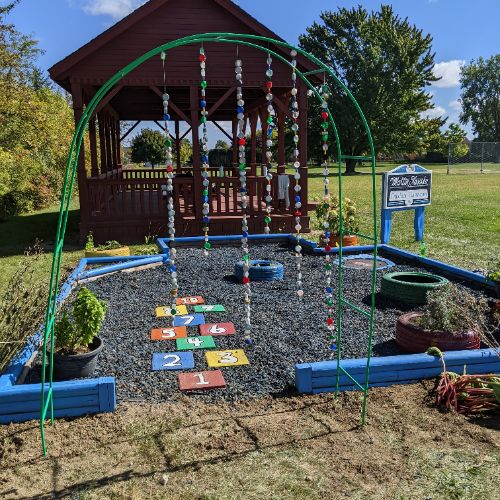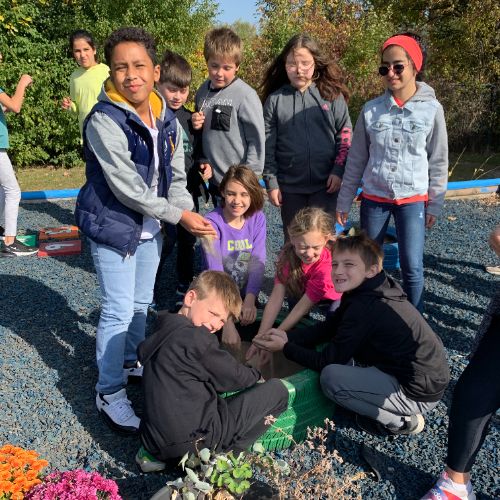- Utica Community Schools
- Homepage
Burr Sensory Garden Grows through MCC Partnership
 What was once an overgrown garden area that had been neglected over time has been transformed into something both beautiful and beneficial for Burr Elementary.
What was once an overgrown garden area that had been neglected over time has been transformed into something both beautiful and beneficial for Burr Elementary.
Andrea Misho, Parent Teacher Organization (PTO) officer at Burr Elementary and co-advisor of Macomb Community College’s Occupational Therapy Assistant Student Leadership Organization (MCCOTA), saw this overlooked space and knew the positive impact it would have on students with special needs.
“The Sensory Garden is an ever growing and changing component of the playground that will benefit students for years to come,” Misho said.
“The Sensory Garden serves a different purpose than a traditional playground,” Burr Elementary Principal, Jeanne Poleski, said. “It supports all students including those whose senses may become easily overloaded on a traditional playground.”
The Sensory Garden project has been led by the MCCOTA with friends, family and community putting in over 100 hours of work. Students from Girl Scouts Troop 77676 and clients and staff from the Therapeutic Rehabilitation and Vocational Training Centers also helped with the project.
“My favorite part of the garden is the collaboration from multiple groups and individuals wanting to offer their assistance and expertise,” said Misho. “The MCCOTA developed the plan, assisted with the budget and sought out community partners to work together to bring this vision to life.”
Joining the MCCOTA have been students from Girl Scouts Troop 77676 and clients and staff from the Therapeutic Rehabilitation and Vocational Training Centers which provides therapeutic and meaningful job training to survivors of catastrophic brain and spinal cord injuries.
Burr Elementary now provides a calming space for children and adults alike thanks to the help of nearly 30 volunteers, along with the input from students, such as Misho’s daughter Ari who has autism and ADHD.
“Not only has the garden been a space my daughter enjoys being in, but she has also been vital in the testing of the items we’ve incorporated and has offered many ideas to the development of the garden,” Misho said.
As Misho pointed out, the Sensory Garden offers a lot to invoke all the senses.
“Being able to interact with your peers promotes emotional regulation which many children with special needs require assistance with to further master,” said Misho.

The following features have been added to the Sensory Garden, or will be added this year:
-Raised garden boxes to promote the sense of smell and tactile input
-Sand “box” tires that allow for tactile and proprioceptive input through weighted objects hidden within the sand
-Hopscotch entrance promoting coordination of cognitive skills with motor and social skills
-Seesaw for vestibular input
-Music walls for hearing and proprioceptive input
-Bottle cap curtain entrance and a water wall
“The benefits of the garden do not end when the students leave the Sensory Garden, rather it sets them up to be better prepared for the rest of their day,” Misho said.
“We are hoping it sparks a love of exploration and nature that the kids bring home with them and share with their families.”

